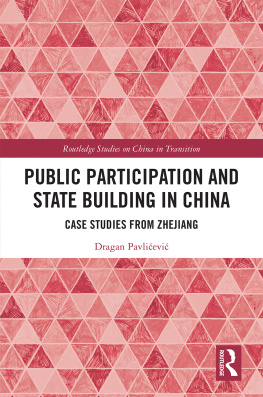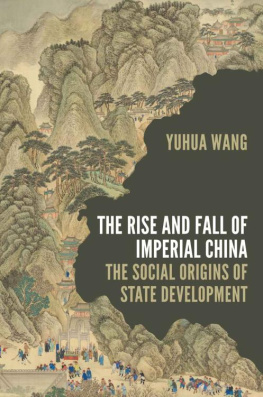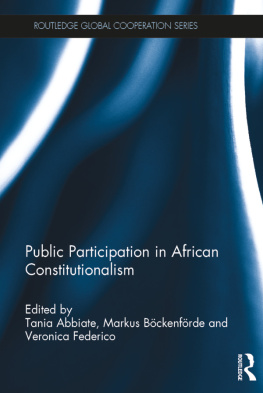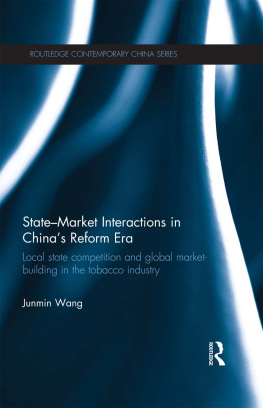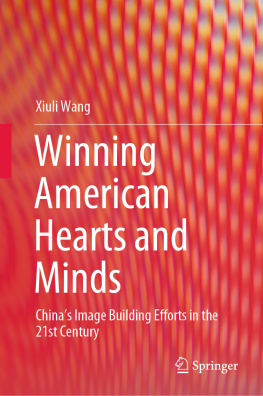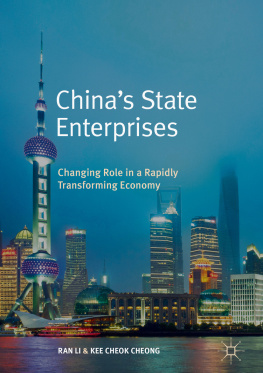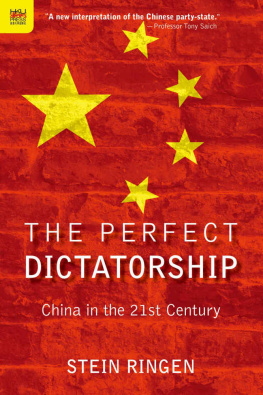Public Participation and State Building in China
This book explores non-electoral means of public participation in contemporary China, both as an outcome of and a key contributor to the party-states efforts to improve its governing capacity.
Examining consultative meetings, public hearings, and the use of surveys and questionnaires in Zhejiang province, on an empirical level, the study evaluates the historical development and institutional backgrounds of these mechanisms, as well as provides a critical assessment of their achievements and failures. At the same time, on a theoretical level, this book contributes to the broader scholarship on contemporary Chinese politics and political development within one-party regimes, as well as debates about state building and democratisation. Relying on the distinction between access to and exercise of power, it concludes that non-electoral public participation is a function of state building. Developing a state capable of producing effective solutions to governing challenges, it is argued, requires public participation in the governing process.
With analysis informed by interviews with local-level policy-makers and officials, academics, and citizens representatives and activists, Public Participation and State Building in China will be a valuable research resource for students and scholars of Chinese politics, political science, and civil society.
Dragan Pavlievi is an Associate Professor in China Studies at Xian Jiaotong Liverpool University, China. He holds a PhD from the University of Nottingham and was previously Visiting Research Fellow at the East Asian Institute, National University of Singapore.
Routledge Studies on China in Transition
Series Editor: David S. G. Goodman
50 New Mentalities of Government in China
Edited by David Bray and Elaine Jeffreys
51 Chinas Cinema of Class
Audiences and Narratives
Nicole Talmacs
52 Economic Development in Chinas Northwest
Entrepreneurship and identity along Chinas multi-ethnic borderlands
Joshua Bird
53 Governing HIV in China
Commercial Sex, Homosexuality, and Rural-to-Urban Migration
Elaine Jeffreys and SU Gang
54 Chinas Housing Middle Class
Changing Urban Life in Gated Communities
Beibei Tang
55 Chinas Architecture in a Globalising World
Between Socialism and the Market
Jiawen Han
56 Local Elites in Post-Mao China
Yingjie Guo
57 Public Participation and State Building in China
Case Studies from Zhejiang
Dragan Pavlievi
For a full list of available titles: https://www.routledge.com/Routledge-Studies-on-China-in-Transition/book-series/SE0082
First published 2020
by Routledge
2 Park Square, Milton Park, Abingdon, Oxon OX14 4RN
and by Routledge
52 Vanderbilt Avenue, New York, NY 10017
Routledge is an imprint of the Taylor & Francis Group, an informa business
2020 Dragan Pavlievi
The right of Dragan Pavlievi to be identified as author of this work has been asserted by him in accordance with sections 77 and 78 of the Copyright, Designs and Patents Act 1988.
All rights reserved. No part of this book may be reprinted or reproduced or utilised in any form or by any electronic, mechanical, or other means, now known or hereafter invented, including photocopying and recording, or in any information storage or retrieval system, without permission in writing from the publishers.
Trademark notice: Product or corporate names may be trademarks or registered trademarks, and are used only for identification and explanation without intent to infringe.
British Library Cataloguing-in-Publication Data
A catalogue record for this book is available from the British Library
Library of Congress Cataloging-in-Publication Data
A catalog record has been requested for this book
ISBN: 978-0-367-28092-5 (hbk)
ISBN: 978-0-429-31711-8 (ebk)
Typeset in Times New Roman
by codeMantra
I am deeply indebted to many individuals and institutions for their generous help and contributions during the course of researching and writing this book. Foremost, I wish to thank my PhD supervisors for their continuous support and encouragement. Dr. Zhengxu Wang kept the open door policy throughout my PhD studies and provided opportunities for me to engage in other research projects and activities. Dr. Hongyi Lai aptly drew attention to some weaknesses in my approach and arguments. I thank them for sharing their expertise, ideas, and suggestions as well as for providing constructive criticism. At the same time, I also appreciate that they gave me freedom to go about my research independently. Additionally, Dr. Patricia Thornton and Dr. Chun-Yi Lee, as my PhD thesis examiners, provided valuable feedback on what is now a previous version of this book, all while making my PhD Viva both a pleasant and an intellectually rewarding experience.
My sincerest thanks also go to the School of Contemporary Chinese Studies at the University of Nottingham which provided a dynamic and supportive research environment. Needless to say, I am grateful to the University of Nottingham for granting me the Sir Francis Hill Fellowship for the period of 20102013. This research project could not have been delivered without that considerable financial support. I am also especially indebted to the School of Contemporary Chinese Studies, the Universities China Committee in London, and the University of Nottingham for approving generous individual grants to support my field research in China. Without these research grants, conducting the empirical part of the research would have been much more difficult. Unfortunately, to name all the individuals who made it possible for me to accomplish fieldwork in China during the sensitive times and on such a sensitive topic would by far exceed the space available here. However, I especially wish to thank Prof. Youxing Lang, Mr. Dimin Zhu, Dr. Gregory Moore, Dr. Zhihong Zhu, Dr. Deyong Ma, Prof. Guanglei Zhu, Mr. Fan Li, Ms. Sissy Zheng, Mr. Andy Ye, Mr. Lvfeng Zhou, Mr. Yifei Mu, Dr. Mingsheng Zhu, Ms. Yanhong Liu, Dr. Zhifa Zhou, Dr. Chunyu Shi, and Ms. Shanshan Chen for their helpful arrangements.
Special thanks are due to the Centre for the Chinese Local Government Innovation at Zhejiang Universitys College of Public Administration that invited and hosted me during both of my research trips to China for this project. Prof. Guoquan Chen, Prof. Junqing Wu, Yimin Mao, Yao Lv and other members of the Centres research team made sure I felt like a welcomed member of the team and shared their resources and knowledge with me. Of course, my deepest appreciation is reserved for those that accepted to be interviewed for this study and who remain anonymous.
I also wish to extend my deepest gratitude to the Department of China Studies at Xian Jiatong Liverpool University for providing a stimulating and supportive environment while I was working on developing my PhD thesis into a book.
Finally, I owe the most profound debt of gratitude to my family. To my brother, for being there when I needed a push to cross the finish line. To my parents words cannot express how grateful I am for unconditional love and support they offer. And Jelena, my partner, for offering love, support, and encouragement throughout the long period I spent working on this study. Without their understanding and support, I would not have started nor completed this research.

